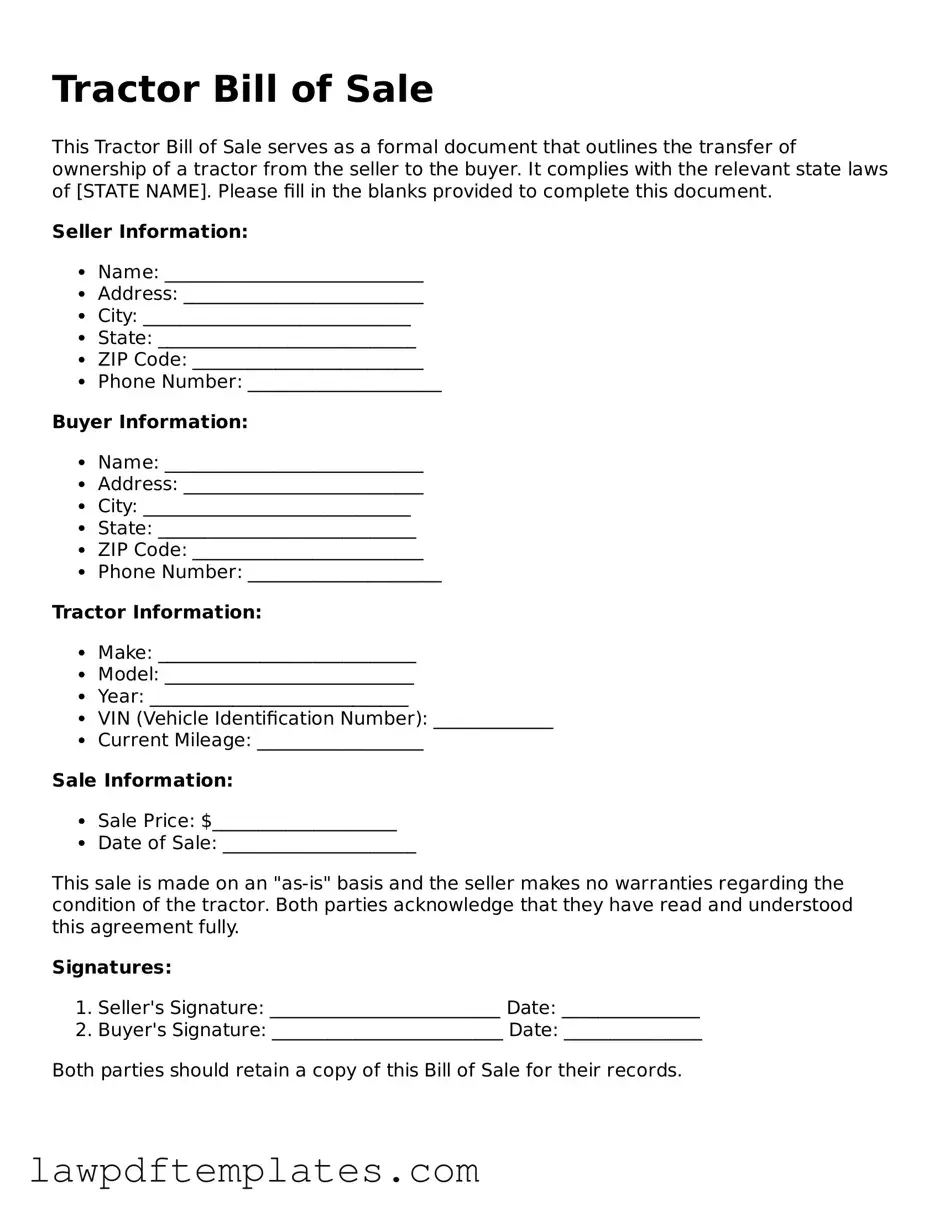Attorney-Approved Tractor Bill of Sale Document
State-specific Tractor Bill of Sale Forms
Form Breakdown
| Fact Name | Description |
|---|---|
| Purpose | The Tractor Bill of Sale form serves as a legal document to transfer ownership of a tractor from one party to another. |
| Requirements | Typically, the form must include details such as the names of the buyer and seller, the tractor's make and model, and the sale price. |
| State-Specific Laws | In many states, including California and Texas, the sale of agricultural equipment like tractors may be governed by specific laws related to property transfer. |
| Importance of Signatures | Both the buyer and seller should sign the form to validate the transaction and ensure that both parties agree to the terms outlined in the document. |
Sample - Tractor Bill of Sale Form
Tractor Bill of Sale
This Tractor Bill of Sale serves as a formal document that outlines the transfer of ownership of a tractor from the seller to the buyer. It complies with the relevant state laws of [STATE NAME]. Please fill in the blanks provided to complete this document.
Seller Information:
- Name: ____________________________
- Address: __________________________
- City: _____________________________
- State: ____________________________
- ZIP Code: _________________________
- Phone Number: _____________________
Buyer Information:
- Name: ____________________________
- Address: __________________________
- City: _____________________________
- State: ____________________________
- ZIP Code: _________________________
- Phone Number: _____________________
Tractor Information:
- Make: ____________________________
- Model: ___________________________
- Year: ____________________________
- VIN (Vehicle Identification Number): _____________
- Current Mileage: __________________
Sale Information:
- Sale Price: $____________________
- Date of Sale: _____________________
This sale is made on an "as-is" basis and the seller makes no warranties regarding the condition of the tractor. Both parties acknowledge that they have read and understood this agreement fully.
Signatures:
- Seller's Signature: _________________________ Date: _______________
- Buyer's Signature: _________________________ Date: _______________
Both parties should retain a copy of this Bill of Sale for their records.
Common mistakes
When filling out the Tractor Bill of Sale form, many people make common mistakes that can lead to issues down the line. One frequent error is failing to provide complete information about the tractor. This includes missing details such as the make, model, year, and Vehicle Identification Number (VIN). Omitting any of these details can create confusion and complicate the sale process.
Another mistake is not including the correct date of the transaction. The date is crucial for establishing the timeline of ownership. If the date is incorrect, it could lead to disputes regarding ownership and liability.
People often overlook the importance of both the buyer's and seller's signatures. Each party must sign the document to validate the sale. Without these signatures, the bill of sale may not be legally binding.
Additionally, some individuals forget to include the sale price. This detail is essential for both parties to understand the terms of the sale. Leaving it blank can lead to misunderstandings about the financial aspect of the transaction.
Another common mistake is not providing the buyer's and seller's contact information. This includes full names, addresses, and phone numbers. Having this information is important for any future communication or if issues arise after the sale.
Many people also fail to check for spelling errors or incorrect information. Simple mistakes can lead to complications, especially if the information does not match official records. Always double-check the entries before finalizing the document.
Some sellers neglect to mention any liens or loans associated with the tractor. It is essential to disclose any financial obligations tied to the vehicle. Not doing so can result in legal issues for both parties.
Another oversight is not providing a detailed description of the tractor's condition. This includes noting any existing damage or mechanical issues. A clear description helps manage expectations and protects both parties in case of disputes.
People sometimes forget to make copies of the completed bill of sale. Keeping a copy for personal records is important. This can serve as proof of the transaction in case questions arise in the future.
Lastly, some individuals fail to understand the specific requirements for their state. Each state may have different regulations regarding the sale of vehicles. Familiarizing oneself with local laws can prevent future complications.
Consider Popular Types of Tractor Bill of Sale Documents
Free Bill of Sale for Firearm - By using this form, sellers can feel more secure about their rights regarding the sold firearm.
To facilitate a smooth transaction, using the Trailer Bill of Sale form is crucial, and for those looking to access convenient templates, you can visit PDF Documents Hub for a variety of resources that can help you complete the process efficiently.
Free Printable Bill of Sale for Mobile Home - Vendors and buyers often use this form as a fundamental piece of evidence in a legal transaction.
